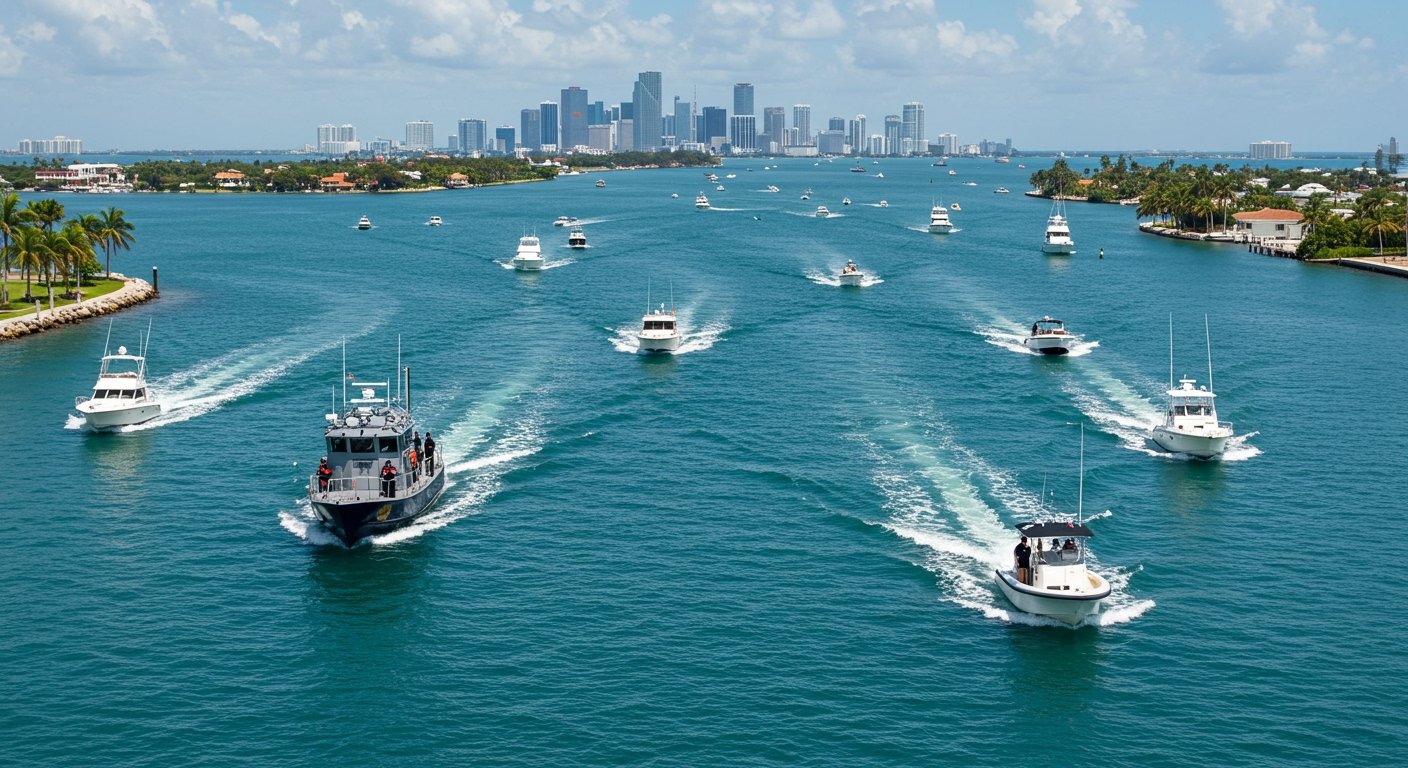MIAMI, FL – Waters off Miami-Dade County registered the highest number of reported recreational boating accidents in Florida last year, according to a new report released by the Florida Fish and Wildlife Conservation Commission (FWC). The data highlights persistent safety challenges on the state’s busy waterways and underscores the timing of an impending law designed to curb dangerous boating practices.
Florida’s 2024 Boating Accident Statistics Unveiled
The FWC’s annual report, detailing recreational boating accidents for 2024, identified a total of 685 “reportable” incidents across Florida. This figure represents an increase compared to the 659 reportable accidents recorded in 2023, indicating a concerning upward trend despite ongoing safety campaigns.
A “reportable” accident, as defined by FWC criteria, includes any incident involving a vessel that results in death, injury requiring medical treatment beyond first aid, damage to the vessel or other property exceeding $2,000, or the disappearance of a person from the vessel. The 2024 statistics provide a detailed picture of where these incidents are occurring most frequently.
Leading the state in the volume of reported accidents was Miami-Dade County, with 75 incidents. The county’s extensive coastline, numerous waterways, and high volume of recreational boat traffic likely contribute to this statistic. Following Miami-Dade, the county with the second-highest number of accidents was Monroe County, home to the Florida Keys, reporting 69 incidents. Palm Beach County ranked third with 45 accidents.
Other counties listed in the top ten for reported boating accidents in 2024 were:
* Pinellas County: 42 incidents
* Okaloosa County: 37 incidents
* Lee County: 35 incidents
* Brevard County: 29 incidents
* Sarasota County: 29 incidents
* St. Johns County: 21 incidents
* Broward County: 20 incidents
The FWC report serves as a crucial resource for understanding boating safety trends and identifying areas where education and enforcement efforts may need to be intensified.
“Lucy’s Law” Targets Reckless Behavior
The release of the FWC’s 2024 accident data coincides with the final preparations for the implementation of House Bill 289, also widely known as “Lucy’s Law.” This significant piece of legislation, signed into law last year, is set to take effect statewide on July 1, 2025. It represents a legislative response to serious boating accidents and aims to impose stricter penalties for dangerous on-water conduct.
“Lucy’s Law” was notably inspired by the tragic death of 17-year-old Lucy Fernandez in a boating accident that occurred in 2022 near Boca Chita Key, just off the coast of Miami-Dade County. Her death brought renewed attention to the need for enhanced accountability for reckless boaters.
Key provisions of House Bill 289 include increased penalties for individuals convicted of reckless boating and for those who leave the scene of a boating crash. These changes are intended to deter irresponsible behavior on the water and ensure that those involved in accidents face appropriate legal consequences.
One of the most impactful aspects of the new law is its mandate for a minimum prison sentence of four years for individuals convicted of boating under the influence (BUI) that results in serious injury or death. This specific provision is designed to align the penalties for impaired operation of a vessel more closely with the penalties faced by individuals convicted of driving under the influence (DUI) on Florida’s roadways. This alignment reflects a legislative recognition that operating a boat while impaired carries risks comparable to impaired driving and should be treated with similar legal severity.
Implications for Boating Safety in Florida
The FWC’s accident statistics underscore the challenges faced by law enforcement and safety advocates in managing the increasing popularity of recreational boating in Florida. The state’s abundant waterways attract millions of boaters annually, from seasoned operators to novice enthusiasts. While the vast majority navigate safely, the consistent number and recent increase in reportable accidents highlight the critical importance of vigilance, proper training, and adherence to safety regulations.
The high concentration of accidents in counties like Miami-Dade, Monroe, and Palm Beach suggests that areas with dense boat traffic and complex navigation present elevated risks. Factors such as speed, inattention, inexperienced operators, and substance impairment are common contributors to boating accidents, mirroring issues seen on roads.
The upcoming implementation of “Lucy’s Law” (House Bill 289) in July 2025 is anticipated to have a significant impact on boater behavior. By increasing the stakes for reckless operation and BUI, the law provides law enforcement with stronger tools to prosecute offenders and aims to foster a culture of greater responsibility among boaters. Advocates hope that the stricter penalties, particularly the mandatory minimum sentence for BUI, will serve as a powerful deterrent.
As Florida heads into another busy boating season, the FWC’s report serves as a stark reminder of the potential dangers on the water. The combination of detailed accident data and the proactive legislative measures embodied by “Lucy’s Law” signals a concerted effort by state authorities to enhance safety and reduce preventable tragedies on Florida’s diverse aquatic landscapes.





